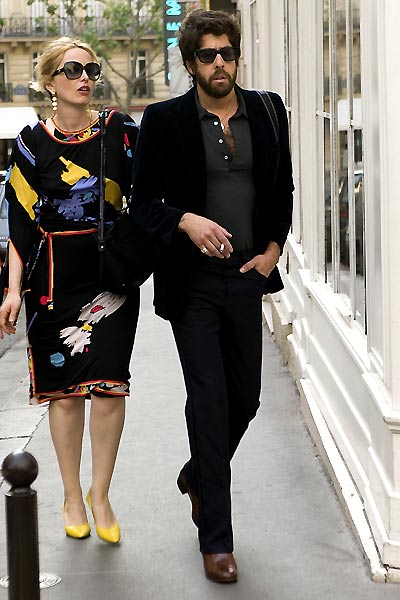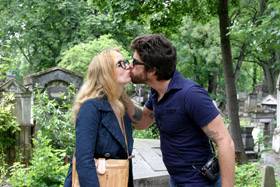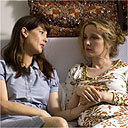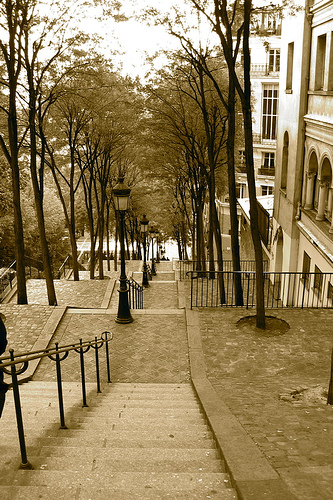Ellen and Jim Have a Blog, Too
We are two part-time academics. Ellen teaches in the English department and Jim in the IT program at George Mason University.


Julie Delpy's _Two Days In Paris_ · 11 September 07
Dear Harriet,
This past late Sunday afternoon I saw Julie Delpy’s Two Days In Paris: she directed the film, wrote the script, & starred. I very much enjoyed the experience on off & want to recommend seeing the film to others. It’s played successfully (got big audiences) in our art cinema theater for some weeks now, and will disappear soon.
The movie is about a professional couple in their mid-30s, Marion (played by Julie Delpy), a French photographer now living in New York City, and her partner, Jack (Adam Goldberg). As the film begins we see them sleeping together in a train car headed for Paris. They’ve been living together for 2 years and this summer travelling together for six weeks; places experienced include Venice and Germany. They return to Paris to pick up Marion’s cat who they left with her parents. Her parents, Anna (Marie Pillet) and Jeannot (Albert Delpy—Julie’s real actor father, playing a caricature of himself), can now meet Jack for 2 days, and Marion can meet with other friends.
The center of the film is the reality that the couple’s relationship is anything but ideal. They not just fight once in a while; they are continually bickering about small and large things. Until near the end of the film, they never get angry or alienated enough to break up, and they assert now and again that they love one another, but they are continually at odds. He is somewhat uncomfortable in French culture (which he sees through stereotypes). He has never learned enough French to take in ordinary conversation. Marion is not sure he respects or loves her, and wants to be mistress of her destiny. Repeatedly Jack seems insecure: at the opening of the film Jack complains he’s met no one has known though according to a book he read he should surely have come across a few acquaintances by now. By contrast in Paris, Marion has not only parents, a sister, and lots of friends; she keeps up her relationship with ex-boyfriends. While much of the dialogue and events are funny, some is anguished & all feels as real as a movie with such lovely gifted lucky stars allows.

Marion (Julie Delpy) and Jack (Adam Goldberg) on their way to a party
The core struggle is Jack is intensely jealous because Marion has had numerous lovers before him; this makes him distrustful of her. Again by contrast, Marion does not care what lovers Jack has had before her. He accuses her more than once of having lovers right now, and brings forward evidence of previous affairs he finds in her room, cell phone, anywhere, and this drives her to lie which rouses his suspicion even more. They are unable to resolve these issues but do not want to break up.
Jack and Marion kissing as they part for a few hours
What makes the film important and striking are the ways in which it’s a woman’s film. It’s ironic, realistic, comic and autobiographical, sentimental yet sobering all at once.
The narrator is Julie Deply; as Marion, her voice is a constant presence, provides the story of Marion when young, and comments on what’s going on, almost leaving us with the sense she is herself framing the scenes as we go. A female narrating a film is highly unusual; and while the two main characters are a man and woman, and there are just as many scenes which focus on the man as the woman, the accent or outlook seems to me that of the woman rather than the man though his views centrally shape what happens.
The film feels autobiographical, and on an autobiographical level Delpy is showing us what a mature woman living alone has to contend because she is living a free mature sexual life each time she takes a new lover or partner. The man doesn’t have to contend with the woman’s distrust this way. He has to contend with her desire to assert herself independently and yet be treated as alluring, and with affectionate tenderness and consideration.
Unless one were to see the continual narration as voice over- there is no voice over. Voice is not used for Marion’s private thoughts until the end of the film; Delpy’s voice is talking to the audience directly. Nonetheless, she does not interpret what we see; we have to read the movie scenes ourselves.
It’s done in the home-movie realistic style that has come to be common and found in the other 2”hit” movies which came to the US Delpy was in: Before Sunrise and Before Sunset. When I came to the theatre for a moment, I feared she was really remaking these with herself as director, and there is a parallel, but as the story of the movie proceeds, it becomes obvious she is not. Indeed her film is a contrast to the idylls she was in earlier.
I loved the way sex was shown; the incidents were funny and prosaic. We see them somewhat uncomfortably rolling inside a heavy blanket on a thin bed. Jack finds condoms far too small in France and tight. We feel we are witnessing them trying to put his condom on him. It’s not quite since they are doing this while under the blankets. They struggle to get it on him. He asks if these are “kids condoms.” (When I got home and told Jim this, he said [for the first time] he found the condoms in Italy very tight and small.) The frankness gets rid of the mystification and glamor that surround sex. She wants to be on top and he objects she always gets to be on top. She says that’s not so. He suggests anal intercourse and she responds by turning over to sleep with her cat in her arms.
She has a temper and gets angry in public at others. This is a no-no for a woman. He can become angry, but is in more control because is less threatened. When she comes across an old boyfriend who mistreated her, she cannot control her bitterness. He misbehaves by lying to a bunch of Americans about where the Louvre is (because they wear pro-Cheney shirts and are rather dowdy, chubby aging females in T-shirts), and gets into comic troubles when without her. He’s particularly uncomfortable at a party where she spends time with ex-boyfriends, and she too looks suspicious when she sees him spending a long time with her sister, Rose (Aleksia Landeau).
Marion and Rose in a confiding moment
There is tension and difficulty as Jack meets Marion’s parents for the first time and they talk about him (not always flatteringly) in French he cannot understand. They have stereotypical ideas about Americans and her father especially tries to test him by naming French writers to see if he admires them. There are effective scenes in the marketplace when Marion, Jack, & Jeannot, her father go to a marketplace together.

Albert Delpy (a photo of him not in costume)
Marion’s cat has gained 10 pounds because Anna, her mother overfed it in her anxiety to do right by it, and Marion scolds Anna. Anna defends herself and later tells Jack separately about her own earlier sex life. Marion’s parents’ frankness about their sex lives and sexual thoughts shocks Jack. (They are staying in Marion’s old somehwhat separated attic room.)
Marie Pillet (from another movie)
Delpy also reveals that myths about Paris and France being especially forward thinking and for high culture are absurd. Numerous scenes with cab drivers show them to be as reactionary and diverse as anyone.
There are moments where I did feel a little that the movie could have been cut or was meandering, but it did have an overarching tension driven story, which ends in a powerful climactic scene. Jack & Marion do come near to breaking up when he accuses her of having sex with other men since they have been together, and they part after a quarrel and spend the second half of their second day in Paris alone walking and in crowds. They have never been able to talk out their conflicts and at the end of the day meet in her room and do.
The movie seems to me to exist for this last scene of confrontation and Marion’s long speech in voice-over, the last we hear. She says turns to the audience once again and says she is tired of breaking up; weary; she’s 35 and it’s getting harder and harder to make a relationship. He’s 35 too and is in the same position. In effect it’s a presentation of why people stay together even if 60% of the time one irritates the other. It’s moving and touching and brilliant and probably frequently true, more true than many people might admit to themselves. I thought this confession an important moment for a woman’s film, what might be called post-feminism. A partnership with a man is a refuge but not one which shelters her or him or changes their relationships to local cliques and the wider structuring of power; and it’s not one which gives a helluva lot of pleasure. Rather it gives stability, a sort of companionship and support.
We don’t really see them make up, but suddenly the scene shifts and we see them in an outdoor cafe in Paris dancing madly together.
This is much better than wandering alone and they do have liens on one another’s nature, shared memories and a way of life as artists in New York. They will return (with her cat). In function Marion’s closing speech like Woody Allen’s at the end his films Love and Death and Annie Hall, but not quizzical or whimsical, rather desperate yet actively resigned.
I haven’t done justice to this film and probably have not conveyed its quicksilver vexed yet determined and hopeful spirit. I haven’t begun to try to convey its French feel, for it’s a very French film in feel: it captures the atmosphere of the city and its different milieus. It is so rare a film by a woman reaches popularity and this is so frank about sex (without mystifying, glamorizing, or being complicit) and love and so intelligent about contemporary relationships, go see it! I think it confronts ordinary experience in a comforting way.
Park stairs in Paris today, art photo
Sylvia
--
Posted by: Ellen
* * *
Comment
- P.S. This morning I suddenly thought that Deux Jours a Paris is comforting because the bickering and quarreling between the two lovers is not that spiteful. The hurtful things they say are really about sex, and in this case Jack’s accusations are wrong. The kind of seething cruelties people are capable of when they fight are not there.
It’s the same with Austen’s Pride and Prejudice. Mr and Mrs Bennet are pastoralized versions of the kind of deep bitterness and raw resentment that exists between incompatible couples who have to live in an environment where their actual desires are continually thwarted and they feel themselves (however wrongly, egoistically) despised.
I came across a review which described Deux Jours a Paris as Woody Allen manque. So I’m not the only one who has seen the parallel. But why is she manque? Because she’s a woman? Why not see Allen as Delpy manque? She at least does not deride the ethnic type she is associated with in front of us, nor demean herself. There's a great deal of unironic self-flagellation in Allen; in Delpy she's examining, telling as much truth as she dares, and validating her life and perception of what existence is like.
E.M.
— Elinor Sep 13, 6:48am #
commenting closed for this article




